Can the city retain its cosmopolitan mix?

The number of expatriate families leaving Hong Kong raises concerns about the city's cosmopolitan character. What about specialists in finance, IT, law, and other "tradeable skills" who are highly mobile? Wang Yuke reports from Hong Kong.
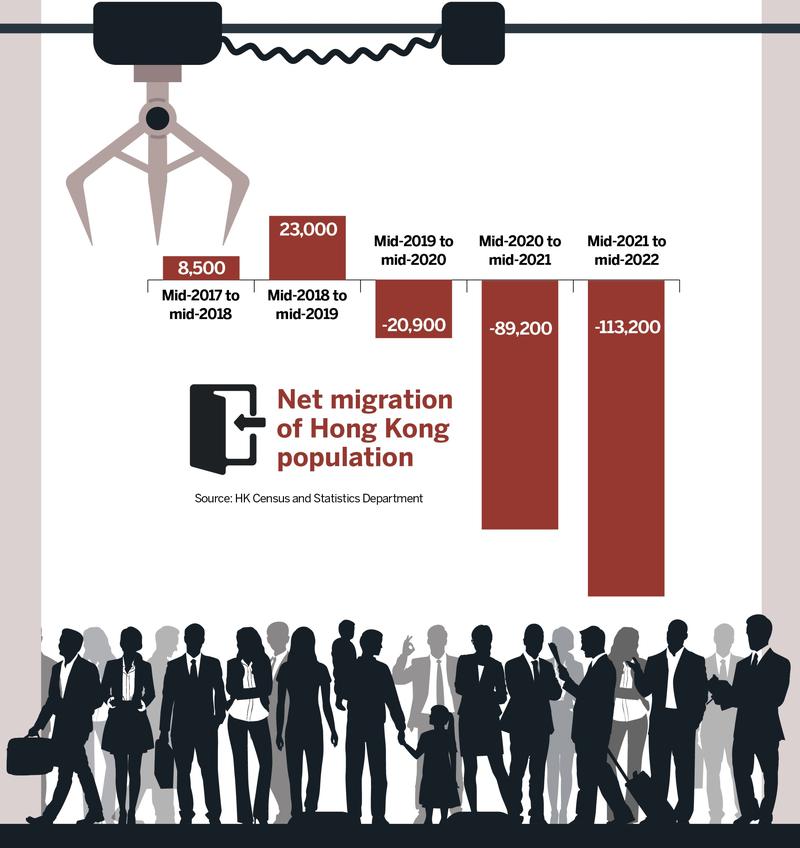
From mid-2021 to mid-2022, 113,200 people emigrated, reducing Hong Kong's population by 1.6 percent - equivalent to an average loss of 310 a day. That is the largest exodus of the past three years.
This surge in departures followed the social turmoil of 2019, and uncompromising COVID-19 quarantine measures, which kept everyone indoors. The stresses on mental health, family and social relationships, were severe for local residents, and particularly onerous for expatriates.
Bernard Chan, chairman and president of Asia Financial Holdings, classifies expatriates into two groups: the first engage business in the Chinese mainland, Hong Kong and Macao special administrative regions and Taiwan, particularly the Guangdong-Hong Kong-Macao Greater Bay Area. They find Hong Kong the ideal gateway. This group was severely handicapped by rigid COVID-related restrictions of the past three years. The second cohort covers the Asia-Pacific region, particularly East Asia. They need to travel frequently. Hong Kong's easy inbound-outbound travel, plus information hub on global trade, finance, and political news, suits them well.
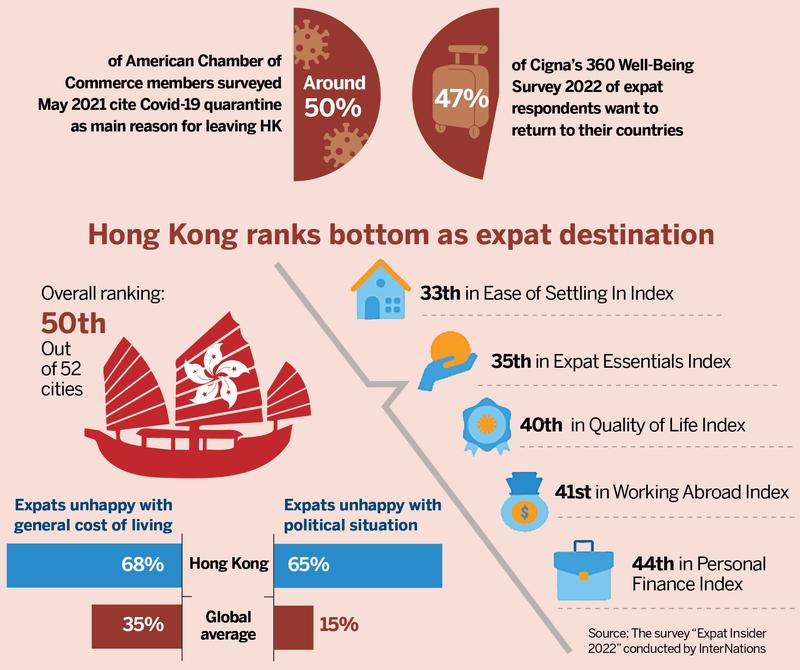
Deep nostalgia
"I don't worry about the former group because they'll come back as Hong Kong reopens," says Chan confidently. "We risk losing the group who have moved out of Hong Kong. They're unlikely to come back ... not until another senior executive rotation restores Hong Kong as corporate regional HQ," says Chan. Expats with children at school, won't hop back quickly. Asian expats who emigrated may return for business opportunities in Hong Kong, while their children progress within quality education systems abroad.
Those being relocated by their companies have great nostalgia for this city, like Belgian Fred, heading to Singapore: "I love Hong Kong's safety and convenience to move around. Also, the mix of outdoor nature - beaches, mountains, trails for hiking, running, cycling - and access to a cosmopolitan city vibe - rooftops, best chefs supplying international cuisines."
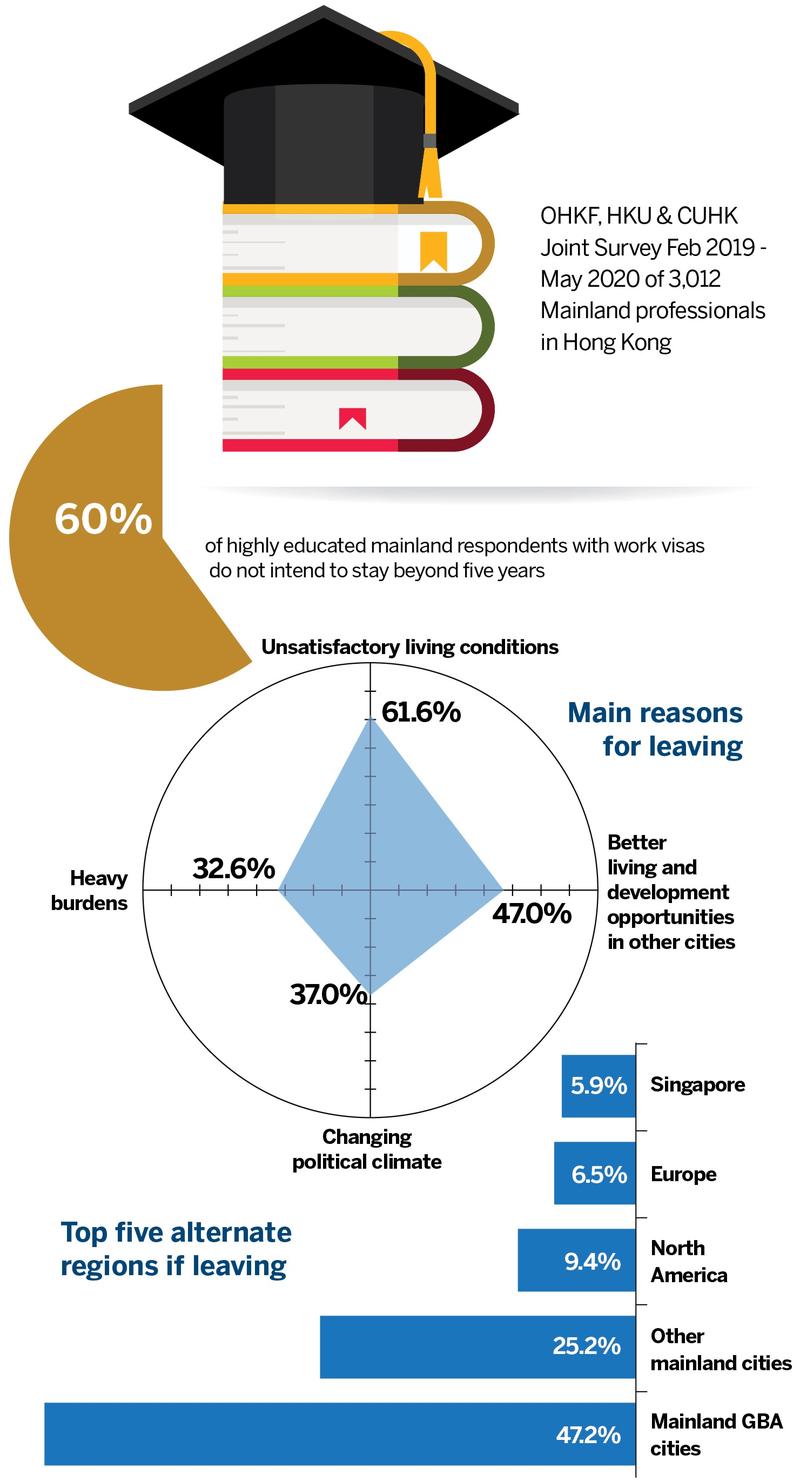
Thomas Gijsels, also from Belgium, will be moving to Hong Kong in January for "an indefinite time". He manages emerging capital markets for Evident, a Hong Kong startup in the tokenization of alternative digital assets. Gijsels considers Hong Kong an exhilarating opportunity for companies trading virtual assets.
Christopher Hui Ching-yu, secretary for Financial Services and the Treasury of the HKSAR, believes the city's unique advantages and attractiveness will increase in the future. "We have overriding advantages, and a wealth of opportunities, within the key national strategies. Expatriates will go where opportunities abound. Hong Kong is naturally an ideal choice."
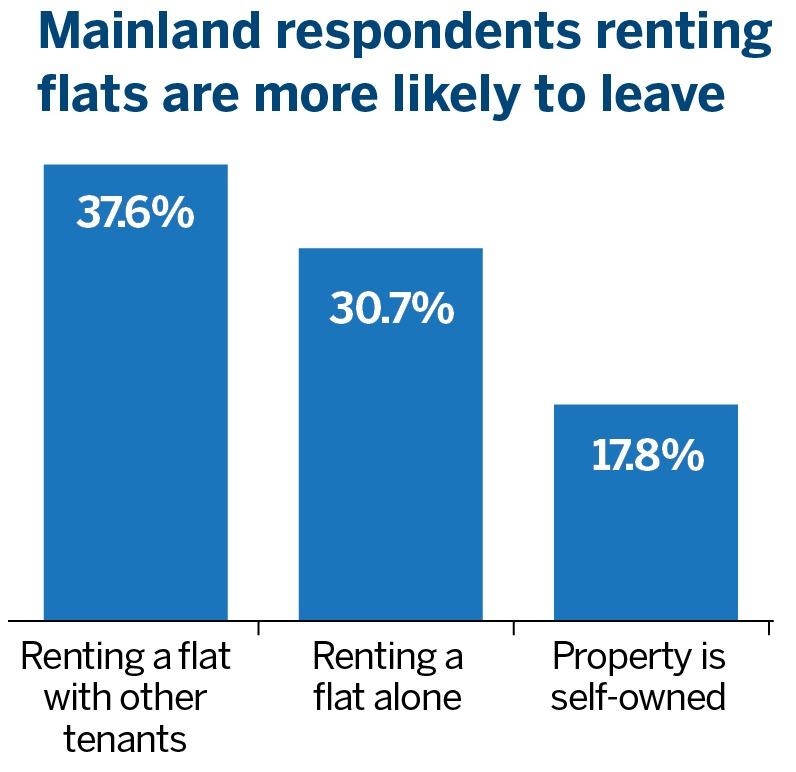
Reasons to exit
It is rarely only one single factor but a cluster that triggers a big decision to relocate, reckons Victor Kwok, assistant research director at Our Hong Kong Foundation. Professionals primarily assess "livability" and "opportunity", he concludes, after probing mainland expatriate satisfaction levels in Hong Kong in a recent study.
The "Facilitating Greater Bay Area Talent Flow and Development Opportunities for Hong Kong Citizens" survey found 60 percent of highly educated mainland respondents in Hong Kong with employment visas did not intend to stay more than five years, citing poor living conditions. Their discontent with Hong Kong's housing costs and tiny flats can be projected onto Western expats too, reflects Kwok.
Another survey, "Expat Insider 2022" conducted by InterNations, found 68 percent of expats unhappy with the cost of living in Hong Kong, nearly double the global average of 35 percent. About 90 percent rate housing affordability here negatively, compared to 43 percent globally. Hong Kong ranks last for housing in the international table.
The report said that the government's tough measures to contain COVID totally crimped the expat after-work socializing in bars, restaurants, and private clubs for the past two years. That disruption to social life affected expats' wellbeing and emotional attachment to the city. They lack a ready community safety net and relationships.
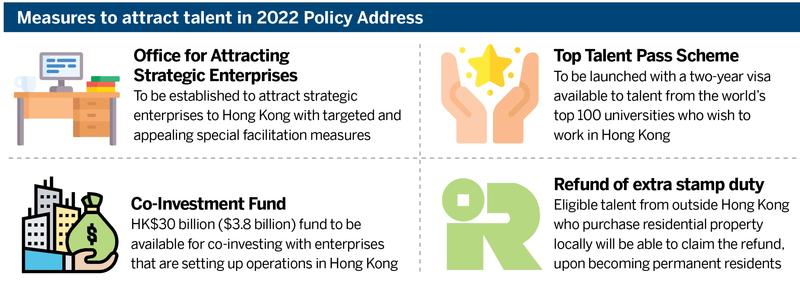
Cigna's annual 360 Well-Being Survey, which covered 15 major expatriate cities, registered 47 percent of respondents in Hong Kong wanting to return to their countries, for lifestyle concerns, and to be closer to family. The survey highlighted the radical curtailment of lifestyle, which reduced expats to despair and alienation - 87 percent felt helpless, trapped, and defeated.
The heavy-handed approach to pandemic prevention and restrictive measures, further diminished Hong Kong's livability, notes Kwok. Drawing a parallel between local residents and expats, Kwok says expats seek economic opportunities. They are a mobile talent pool, and are keen to relocate to places where opportunities abound.
"Hong Kong is a small, open economy with increasing reliance on the Chinese mainland. When the border between the mainland and Hong Kong is restricted, the economic prospects for Hong Kong dim. This is detrimental to Hong Kong's reputation as a free economy," says Wu Yanhui, associate professor of economics, management and strategy at the University of Hong Kong. Wu concedes that political and social factors are at play, too. The report said that in the InterNations survey, Hong Kong flops on "political stability", which was not the case for the city previously. It was considered apolitical and only focused on business.
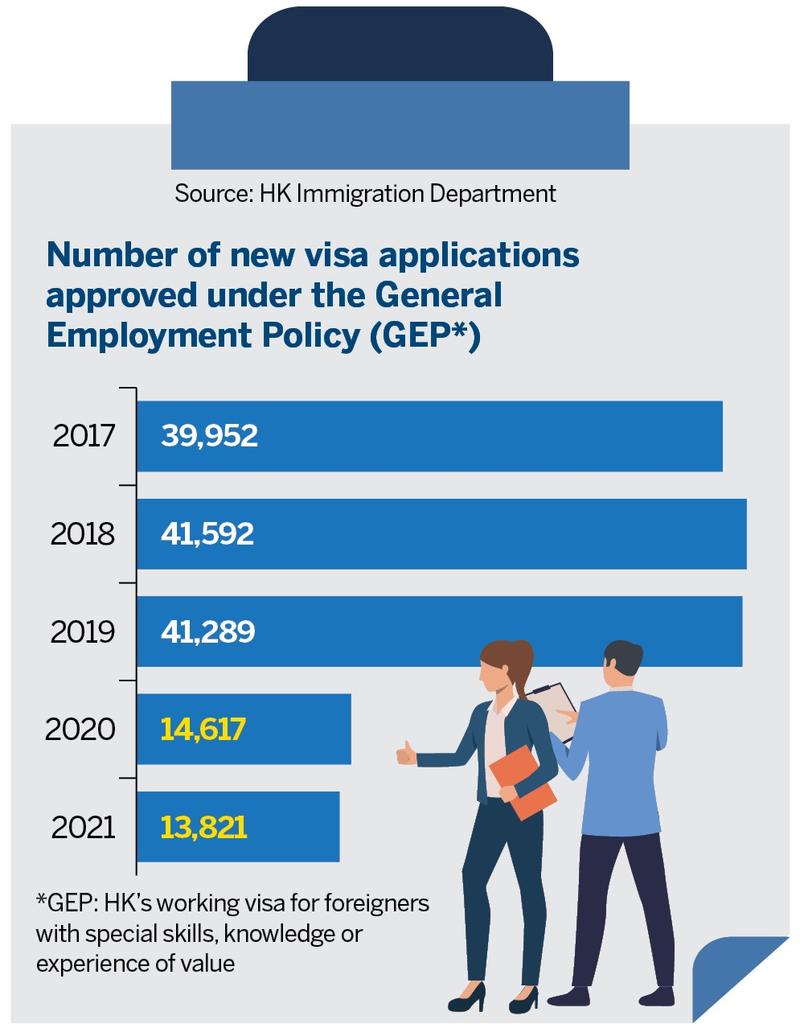
Expat brain drain
The greatest loss for the city could be expat knowledge workers, reckons Wu, as they have options beyond Hong Kong, and are less forgiving of inappropriate governance and other nonwork factors. "This attitude prevails across high-end services such as finance and IT, and among other professionals, including medicare workers and lawyers, whom we economists call 'tradeable services'," observes Wu.
The expat brain drain will put Hong Kong on the back foot if its economy becomes dominated by less value-added, low-end services. "Families with young children wanting a better future for them, are more likely to exit," Wu notes.
Kwok of OHKF deems the loss of science and technology talent most disturbing. "Innovation and technology are pillar industries Hong Kong is striving to develop. We are at a relative disadvantage compared to alternative cities, such as Singapore and Shenzhen."
There is a widely held notion that professionals are in constant flux reacting to opportunities. Kwok believes that as Hong Kong drops its restrictive COVID measures, and borders reopen, all industries in Hong Kong will pick up momentum. "When they (expats) see the changes, I'm sure they will return."
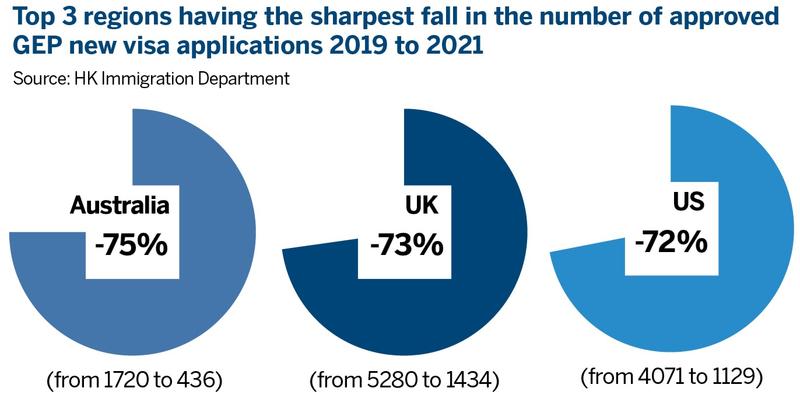
Policy clarity vital
After averaging 40,944 visa approvals over the preceding three years 2017-19, there was a sharp drop in General Employment Policy visa approvals to 14,617 in 2020, and 13,821 in 2021. The steep decline in employment visa approvals impacted applicants from Australia (75 percent), the UK (73 percent) and the US (72 percent) from 2019 to 2021. The visa approval figures run counter to the declared hunt for global talent.
Kwok cites "policy clarity" and proactive domestic and international communication as vital to signal that Hong Kong is back in business. The government has to message potential talent that we allocate more land for housing, improve living conditions, subsidize housing, offer tax breaks, healthcare (vouchers and subsidies), and support child education. "We have to articulate our commitment to develop science and technology, and welcome mega high-tech companies," adds Kwok.
The good news, Kwok continues, is the package taking tangible shape for the 2022 Policy Address, to "shore up the ecosystem for science and technology development through STEAM (science, technology, engineering, the arts and mathematics) education." Kwok further points to mainland talent in the Greater Bay Area as the "low hanging fruit" to capture.
At the triennial PISA (Programme for International Student Assessment) held by OECD (Organisation for Economic Co-operation and Development), for 15-year-old students, Hong Kong knocks the others "out of the ballpark", says Kwok. PISA assesses proficiency in reading, mathematics, science and innovation.
The PISA 2018 showed Hong Kong students beating the OECD average in reading, mathematics and science. Furthermore, a larger proportion of local students than the OECD average, performed at the highest levels of proficiency, in at least one subject.
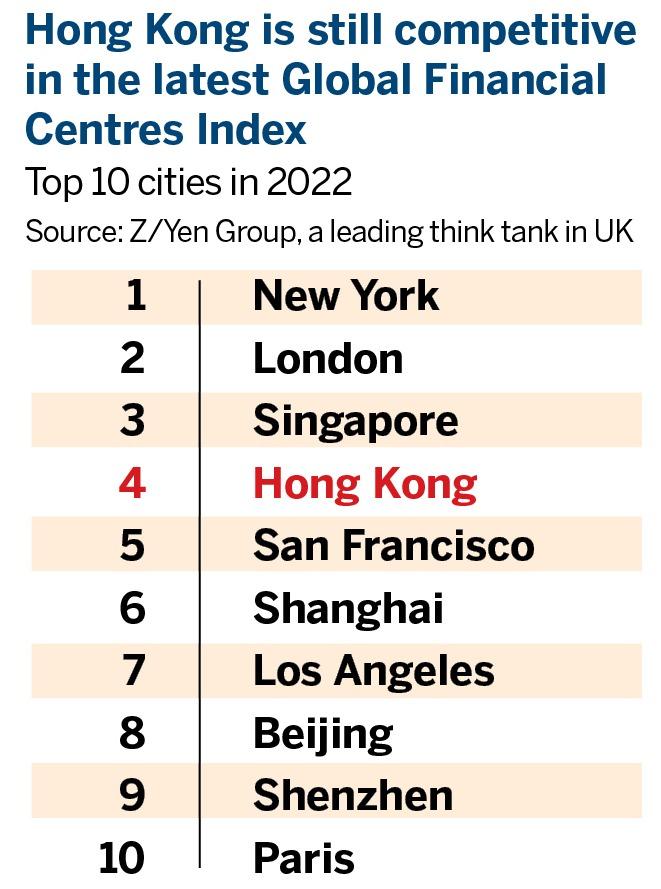
Gateway opportunities
Wu takes a wait-and-see attitude, holding that "whether Hong Kong will remain attractive for expats depends on the extent that Hong Kong can generate good jobs, promote diversity, and improve living conditions."
There's a frisson of excitement in business circles outside Hong Kong, after the city dropped its quarantine measures. Christopher Hui reports that his duty visits to The Philippines and Thailand, attracted big interest among the business and expat communities.
"They are eager to visit Hong Kong to learn first-hand about investment opportunities. Financial professionals are keen to extend their businesses to the mainland through Hong Kong. Some big enterprises in Thailand want to set up family offices here, impressed by our world-class asset management services."
There's every reason to believe that Hong Kong's appeal will bounce back. "I'm very optimistic about Hong Kong's attractiveness," says Bernard Chan, for its unmatched access to international flights, global information flow, business resources, and job opportunities.
Chan underscores quality of life as the biggest pain for expatriates in Hong Kong - with housing the biggest obstacle to overcome. While there may not be a quick fix to housing affordability, a vibrant arts and culture environment may compensate somewhat, contends Chan, who is also vice-chairman of the West Kowloon Cultural District Authority Board.
Contact the writer at jenny@chinadailyhk.com
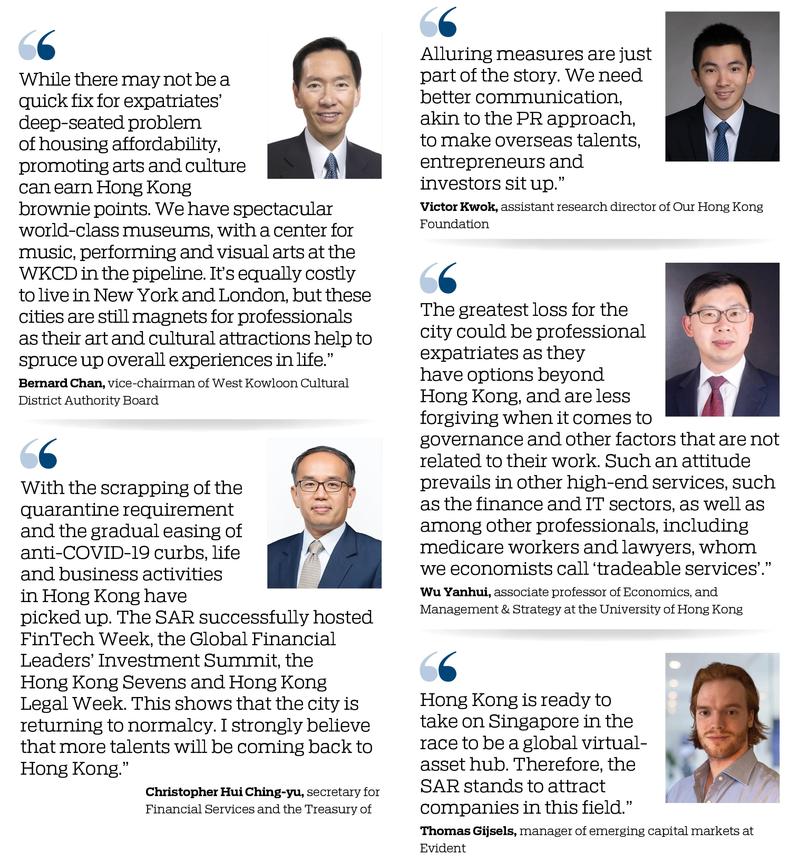
- Diplomats visit important wartime sites
- Tianjin Port crew member rescues a Filipino seaman
- Govt asks medical bodies to submit procurement volume for bulk-buy program
- China's top court enhances handling of foreign-related cases
- Zhengzhou issues flood alert, orders closures amid heavy rainfall
- PLA releases footage of drones hunting 'hostile warship'





































